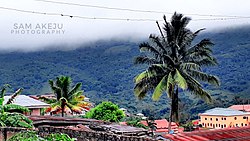Efon Alaaye
| Efon Alaaye | ||
|---|---|---|
|
|
||
| Coordinates | 7 ° 39 ′ N , 4 ° 55 ′ E | |
| Basic data | ||
| Country | Nigeria | |
| Ekiti | ||
| ISO 3166-2 | NG-EK | |
| height | 480 m | |
| Residents | 28,234 (2012) | |
| founding | before 1200 | |
|
Efon Allaye in June 2018
|
||
Efon Alaaye (in Yoruba Ẹfọ̀n-Alààyè ; you can also find the spellings Efon-Alaye , Effon Alaiye , Effon-Alaiye , Efon-Alaaye and Efon Alaiye ) is a city in southwest Nigeria with 299,755 inhabitants in the metropolitan area (2007 calculation). According to calculations in 2012, the city itself has 28,234 inhabitants. It is located in the state of Ekiti in the Yoruba Hills at an altitude of about 480 meters at the intersection of the roads from Ilesha to Ondo and Ado Ekiti . The city is divided into six districts.
The city is a distribution center for agricultural products such as cotton , cocoa , palm and palm kernel oil as well as a market place for fruits, pumpkins , corn , cassava , okra , palm products, rice and yams .
climate
The rainy season starts in April and lasts until the end of October. During the dry season there is strong harmattan with high temperatures during the day and cool nights.
| Efon-Alaiye | ||||||||||||||||||||||||||||||||||||||||||||||||
|---|---|---|---|---|---|---|---|---|---|---|---|---|---|---|---|---|---|---|---|---|---|---|---|---|---|---|---|---|---|---|---|---|---|---|---|---|---|---|---|---|---|---|---|---|---|---|---|---|
| Climate diagram | ||||||||||||||||||||||||||||||||||||||||||||||||
| ||||||||||||||||||||||||||||||||||||||||||||||||
|
Monthly average temperatures and rainfall for Efon-Alaiye
|
||||||||||||||||||||||||||||||||||||||||||||||||||||||||||||||||||||||||||||||||||||||||||
history
The place is first mentioned around the year 1200, when the third king of the Yoruba , Obalufon Alaayemore, founded the place. In the 19th century, the Yoruba peoples of the Ijesa and Efon belonged to the confederation of the Ekiti-Parabo and fought against the 109 kilometers west-southwest of Ibadan for control of a trade route to the coast. As the 45th head of the city, as Alaaye, King Emmanuel Aladejare Agunsoye II (* 1944) has ruled since 1991 as of 2005.
population
The population mainly belongs to the Yoruba language group , mostly to the Ijesa and Efon ethnic groups.
At the 1991 census, the population was 158,977. According to a calculation from 2007, the population in the metropolitan area is 299,755.
Culture and sights
Efon Alaaye has a Christian Apostolic Church college for teacher training and two hospitals - a General Hospital and a Catholic Hospital. There are plans to build a radio and television station in Efon Alaaye.
The palace of the Alaaye has ornate wood carvings. The Babalola Museum houses the remains of the founder of the Christ Apostolic Church, Joseph Ayo Babalola (1904–1959) and his father. The grave is visited by pilgrims.
Web links
- City history by Rufus S. Fasakin (English)
Individual evidence
- ↑ ( page no longer available , search in web archives: population data 2012 )
- ↑ ( page no longer available , search in web archives )
- ↑ Entry on the city in the Encyclopædia Britannica (English)
- ↑ Article in the Daily Trust of July 3, 2008 (English)

